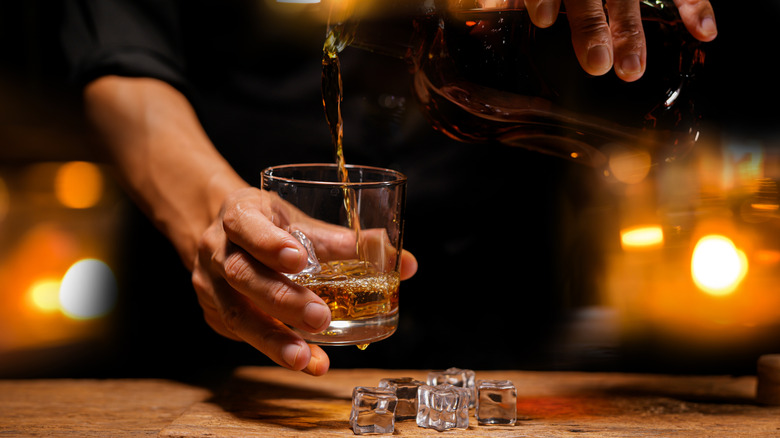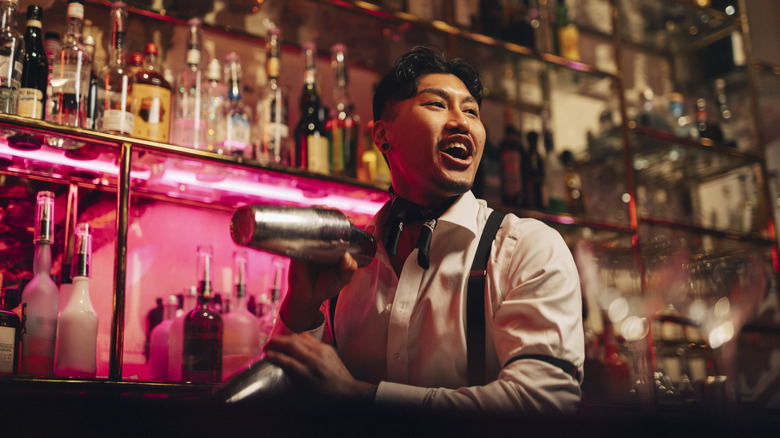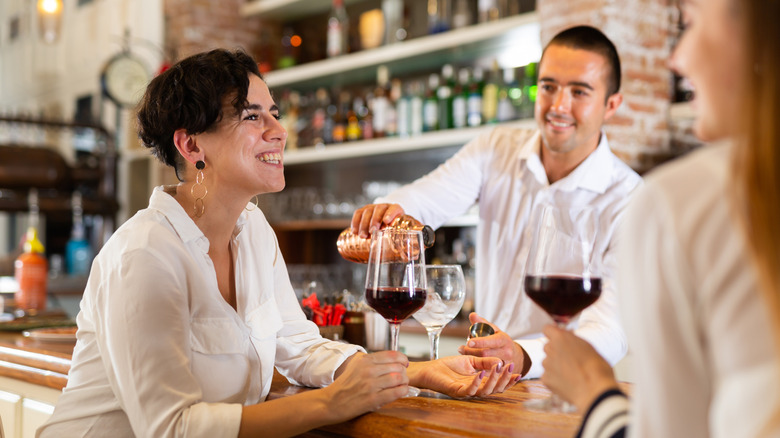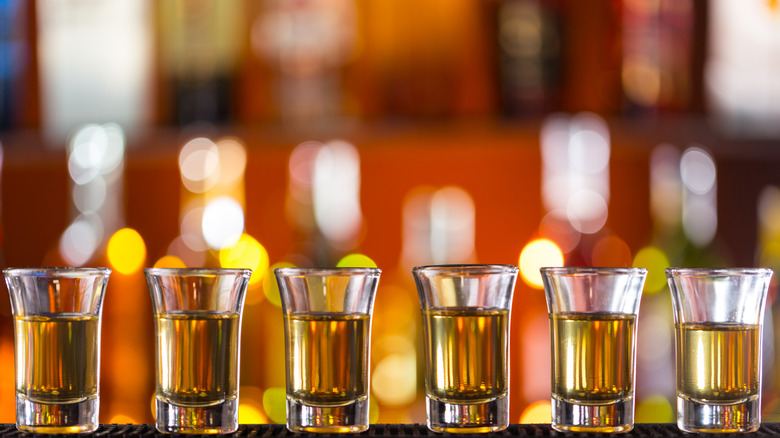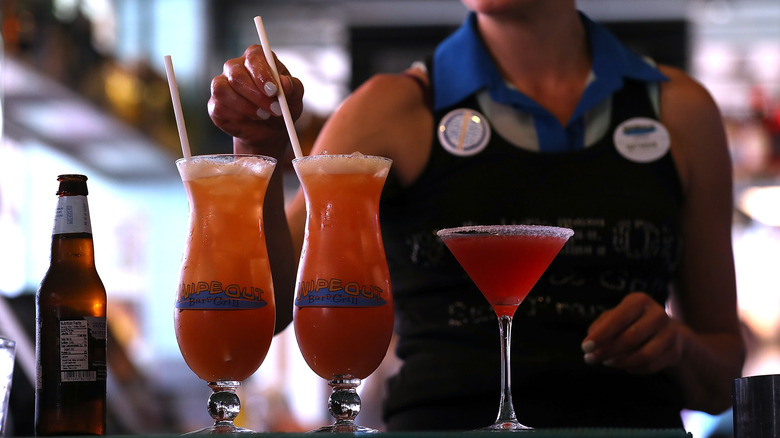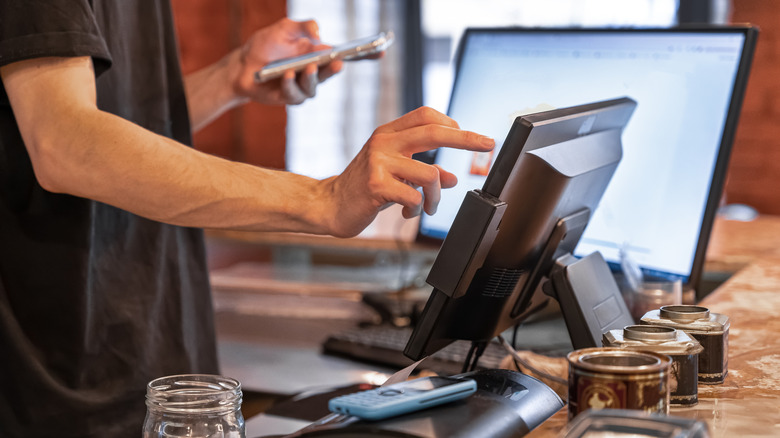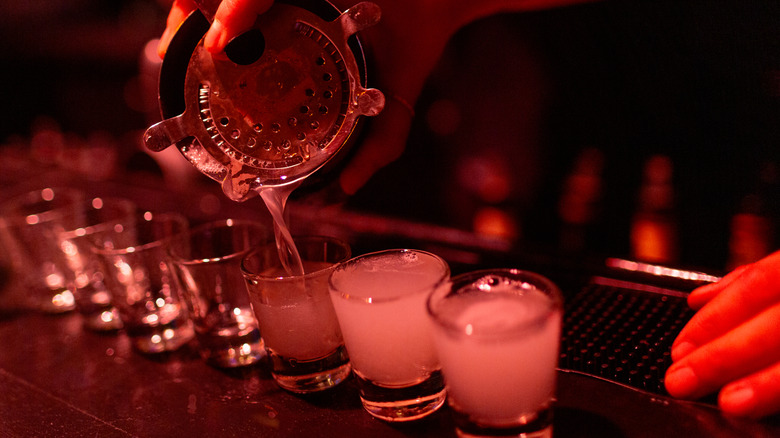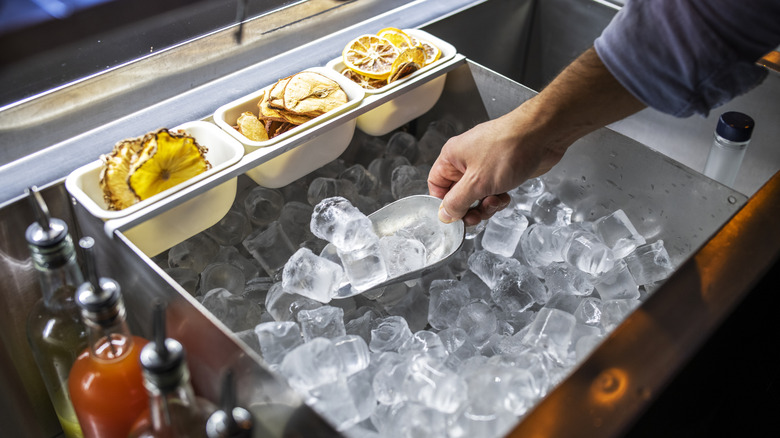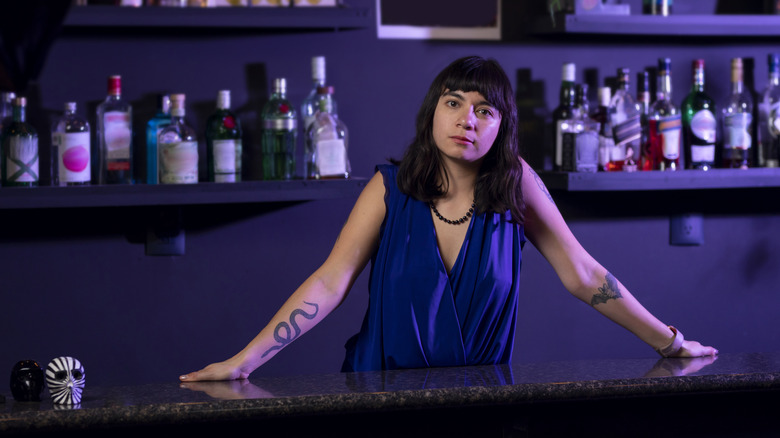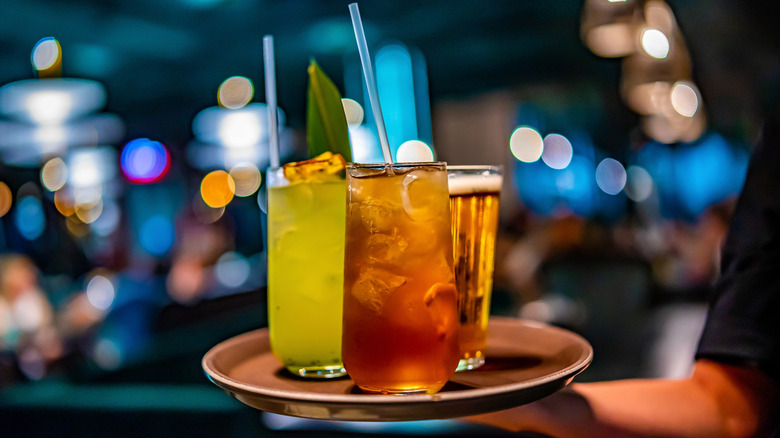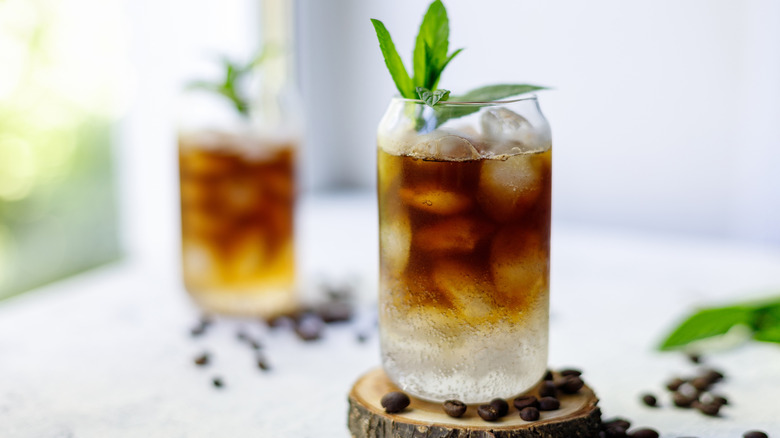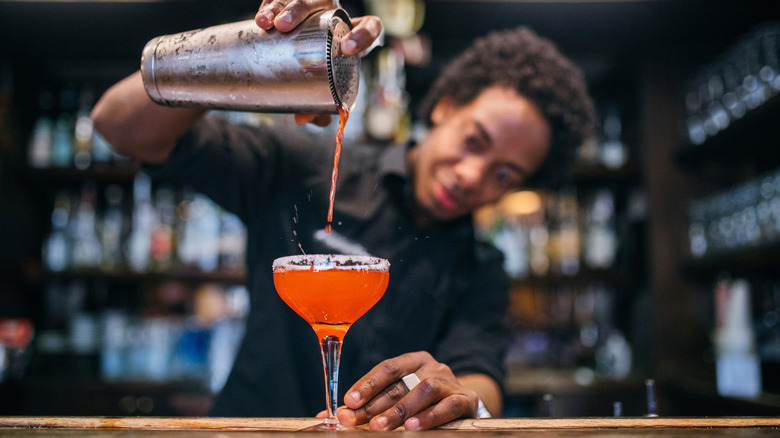What Really Happens When You Ask The Bartender To Make Your Drink 'Extra Strong'
"Hook me up," "make it a strong one," and the dreaded "I can't taste the alcohol in this" are all immediate red flags to your bartender. Very rarely will asking your bartender to heavy-hand their pours put you in their good graces, even if your intent is simply to connect. It may be an innocent comment on your part, but bartenders have heard it too many times from customers hoping for freebies. Apart from being one reason your bartender could end up hating you, complaining about the amount of alcohol could result in a number of things –– but probably not free booze.
I am a former server and bartender with over seven years in the service industry. I've been behind the bar in a range of atmospheres, from platinum country clubs and fine dining restaurants to biker bars and 24-hour diners. As such, I have personally handled hundreds of customers who have requested an "extra strong" drink.
Now, a bartender's distaste for this popular request isn't to say that they can't be generous. However, they usually use their own discretion of whose drink they choose to "hook up." You're better off building a rapport or being kind than to expect special treatment right out of the gate. In other words, if you have to ask for a stronger pour, your chances of getting one are slim. Here's what happens when you ask your bartender for an "extra strong" drink, and it's rarely what you're really asking for.
Your bartender avoids serving you
Bartenders absolutely hate when they're asked to make a drink "extra strong." If you start out your bar experience by suggesting that your bartender doesn't know how to properly make your drink, they're already likely trying to get out of interacting with you. They'll serve you, but don't count on making long conversation with someone after you've told them how to do their job and/or tried to get free alcohol out of them. Bartenders make their money by interacting with customers, so if they are actively ignoring you, then they're probably protecting their peace. It's also possible they are avoiding you because they don't want to hear about how "weak" your drink is.
If the bar is slammed, and you've opened up your bar experience with a request for a strong drink, this is probably the option your bartender will choose. It'll be easier to pretend they're not ignoring you if they have plenty of other customers to tend to. Staying on the other side of the bar and holding long conversions with other patrons is another sign you may be getting the cold shoulder from your bartender. Don't worry, though, they're still most likely going to come around to keep a drink in front of you –– just don't expect it to be a "strong" one.
You become the subject of some serious smack talk
I was a server and bartender for years, so I feel dignified in saying this: Service industry workers' favorite pastime is complaining. Usually, the targets of these complaints are their tables and customers. If you happen to play into one of the many industry pet peeves, you can pretty much count on your server or bartender telling all of their favorite coworkers about it.
This is especially true if you're dining at a table and ask your server to make sure your drink is extra strong. Your server is going to go straight to the bartender to relay your message, but probably not in the way you're imagining and hoping for. They're undoubtedly sharing a look of exasperation before the bartender goes to implement one of the other points on this list when making your drink. The request may even earn you a nickname for the rest of your time at the bar. Just know that "Strongman" isn't a term of endearment, but a sign that you've been made an opening act at the circus that is their night shift.
Service workers often leave work and head to a completely different bar with coworkers after a long shift. If you frequent bars, you've probably been among off-duty restaurant workers smack-talking their earlier customers. Comparing stories of crappy customers is how restaurant employees bond –– you just don't want to be the subject of one of these after-work bar stories.
You actually get a slightly smaller pour
The service industry is full of some of the most hard-working and lovable people around, but some of these passionate workers would also describe themselves as petty. If you are sitting at a bar tended by one of these masters of pettiness, your "extra strong" drink has a chance of actually being a weaker one. This could potentially apply to the drinks of anyone who breaks one of the many bar etiquette rules.
I would say that this isn't something that happens too often, as most bartenders want to make you a good drink and give you what you pay for. Unless you have downed enough alcohol for your bartender to consider cutting you off, you'll likely at least get a standard pour. I have personally never made a weak drink out of spite alone. However, if an attitude or less-than-savory countenance was involved with the request, your bartender is more likely to give you a petty pour. Be careful what you ask for and how you ask it, because you may end up with the opposite.
They pour your alcohol down the straw
In my personal opinion, this is one of the best hacks in bartending and I have done it many times during my stint behind the bar. Pouring a bit of alcohol down the straw makes the drink taste much stronger, despite how much alcohol the drink actually contains. Since the first sip is all alcohol, the drinker believes their bartender has gone above and beyond their request to "hook them up." It's actually a normal pour, but a demanding customer will be all smiles with that extra-strong first sip.
Not only did I use this bartending hack when a customer asked for an "extra strong" drink, but I also used it whenever I wanted someone to think I gave them a strong pour. The trick makes customers feel special and leaves the impression that you'll take care of them, which typically translates to a larger tip. This is one of the must-know tricks I would teach new bartenders.
Pouring an extra bit of alcohol down the straw when a drink is returned for being "too weak" is a great way to make the customer happy without creating waste. The only drawback of this hack is that it requires a straw. Not all alcoholic drinks should come with a straw, and not all customers use cocktail straws even if they're in their drink. When everything goes according to plan, though, this hack makes the strong pour special request a breeze.
You get charged for a double
Drink prices, much like menu item prices, are predetermined based on the ingredients they contain, and a strict recipe. Most establishments have a Point of Sale system that has buttons programmed for each possible drink combination or price point. A lot of the time if a server is ringing in your order, they would need to charge you for any extra alcohol in order for you to receive it from the bar.
With that being said, there are almost no real standards when it comes to bars. Even pour sizes can vary from bar to bar. I've worked at places where a single was one and a half ounces and a double was two ounces. There, it would make sense to charge for a double when you were asked for a stronger pour. I've also worked behind bars where a double was three ounces and the up-charge would almost be like ordering another drink.
Basically, if you ask for more alcohol, you could very well get charged for more alcohol. Sometimes your bartender or server will let you know the extra alcohol will be an up-charge, but it's almost equally likely that they will not. Don't be surprised to see "double" on your check or an up-charge, because you did ask for more than the amount in the drink's recipe.
Your drink gets poured in a smaller glass
One simple way of making a drink taste stronger is to use less of the mixer. Using this technique, your bartender can simply make your drink of choice and pour a smaller amount of mixer in to make your drink taste stronger with the same amount of liquor. The problem comes when the drink no longer fits properly in its designated glass. The simplest solution to this is to throw it in a smaller glass. If the drink would normally go in a pint glass, a highball glass will do great. A drink typically served in a highball glass could fit perfectly in a rocks glass after eliminating some of the mixer.
This is a clever way to handle customers asking for a stronger drink. You're giving them exactly what they've ordered, just not in the way they likely expect you to fulfill their wishes. It's important to also note that some bar customers who order a strong drink actually do want less mixer in a smaller glass. This is a safe option for bartenders, but some customers may notice the glassware switch-up.
Your drink is overloaded with ice
As smart it is to use a smaller glass when using a smaller amount of mixer, sometimes a cocktail has a special glass it must go in. For some house-made cocktail specials, the glass is very much a part of the recipe and aesthetic. If you are asking for a strong version of one of these drinks, your bartender's best bet to make both you and their managers happy is to overload you with ice. You'll receive the same amount of alcohol in the same glass as a normal drink, but with less of the mixer and a whole lot more ice.
One downside to this is that customers tend to notice when ice takes up most of the space in a glass (I'm looking at you and your ice policy, Starbucks!). If a customer is the type to ask for extras right out of the gate, they'll likely be the type to complain about a mountain of ice in their drink. Another negative to this "extra strong" drink outcome is that the drink will quickly become watered down. Using extra ice to make up for less mixer makes for a drink that may look up to par, but will get quite a lot weaker as time goes on.
You get a normal pour with a side of sass
Almost all bartenders will tell you that the customer is not always right, a declaration they'll give right to the customer's face if the situation allows. They are professional back-talkers as much as they are drink slingers, and bartenders can dish it out just as well as they get it when they are pushed. If you are at a more relaxed and low-key bar, your bartender will very likely make it known that they don't appreciate your request.
There are certainly establishments where the staff are encouraged to say "yes" as often as possible. In these places, the more subtle and passive aggressive solutions to the extra alcohol customer are put in motion. Some restaurants aren't afraid to embarrass their customers, though, and bartenders at such establishments will make sure you know you've crossed a line. You could be on the receiving end of a quick quip about going to their work and telling them how to do their job. Or you could also face a loud, very public display of humiliation that will make eye contact with your fellow bar patrons a bit difficult.
Your drink is delayed
If you have already been served and complain about there not being enough alcohol in your drink, there is little chance of your bartender actually remaking your drink. This is unless, of course, you're willing to pay for a double. If there was an actual problem with the drink, a remake is typically no big deal. However, the lack of extra alcohol is not seen as a problem with the bartender's work, but rather one of taste.
What is going to happen to a "weak" returned drink, then? More than likely, the bartender will wait a couple minutes and serve you the exact same drink, possibly dumped in a fresh glass. This charade literally only delays the drinking of your drink and allows the ice to melt more. You may get the tiniest splash of alcohol extra, if they choose to pour a bit down your straw for insurance you won't send it back again. Is the smidgen of added alcohol really worth the hassle and a watered down drink? Probably not.
On busy days, your drink could also be delayed initially if the bartender decides to wait to make it. The bartender could choose to put your drink at the bottom of the priority list due to your unnecessary special request. They may be hoping that the delay will ward off any complaints about the alcohol content.
Your drink is not mixed properly
When a bartender has been asked to make a drink extra strong, they may just pour the alcohol to the bottom of the glass. This could turn the mixer portion of the drink into a floater. This layering method is a less clever trick than the straw hack, but has a very similar outcome. More alcohol will go up the straw in the first sip, making it taste stronger. This makes for a poor drink, though. It will not be made or mixed properly, and the second ¾s of the drink will basically be all watered-down mixer.
A lot of bartenders take quite a bit of pride in their craft, and it would nearly physically hurt them to mix such a poorly made drink. However, they'd typically rather serve a difficult customer a subpar drink than have their legitimate drinks sent back many times and sent to the waste bucket.
The perfect solution to this problem is to just order and pay for a double. Your drink will have the extra alcohol that you desire, and it'll be made the way it is meant to be. You'll get a stronger mixed drink rather than an unenjoyable, layered mess. Plus, your bartender will appreciate it.
Your bartender actually makes your drink stronger
If you have gotten this far, you should have noted that asking for a stronger drink without expecting to pay extra is not wise for a pleasant time out. However, if you are still here with hopes that it'll work out for you, know that this is the least likely outcome and is not typically done in good faith. Remember when I said bartenders can be petty? On rare occasions when a barkeep has had enough, they may pile on the alcohol when someone complains there isn't enough in their drink.
Usually this is only out of spite and they'll only serve a drink of this nature to someone they don't believe will actually drink and enjoy it. A rum and Coke wouldn't be a good contender for this reverse psychology-esque approach, because an overly strong rum and Coke is still pretty great. However, a lemon drop drinker is more likely to get turned off by a large portion of vodka replacing the triple sec, simple syrup, and lemon juice.
The exception to this, of course, is if you have a solid and established relationship with the bartender. If you have the type of friendship that allows for a few digs here and there, then they'll be more inclined to make a stronger drink that tastes right.
